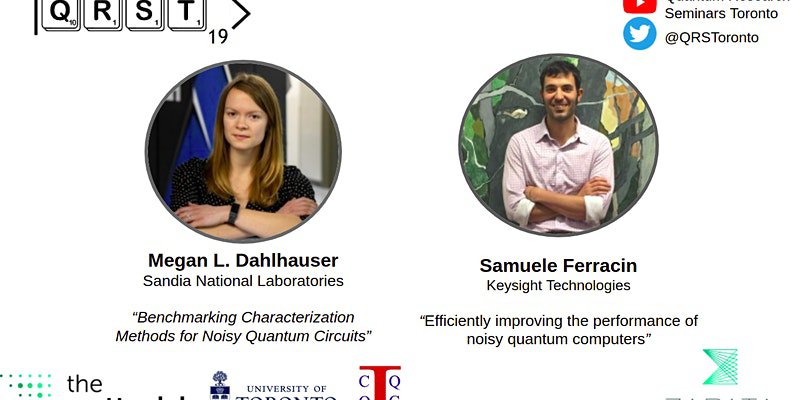
Quantum Research Seminars Toronto consist of two 30 min talks about some Quantum Computation topic. Seminars are given by high-level quantum computing researchers with the focus on disseminating their research among other researchers from this field. We encourage to attend researchers regardless of their experience as well as graduate and undergraduate students with particular interest in this field. Basic notions on quantum computing are assumed, but no expertise in any particular subject of this field.
In this 19th series of seminars, the speakers will be Megan L. Dahlhauser (Sandia National Laboratories) and Samuele Ferracin (Keysight Technologies). Their talks are titled "Benchmarking Characterization Methods for Noisy Quantum Circuits" and "Efficiently improving the performance of noisy quantum computers", respectively.
The event recording, slides and chat history will be published in our Youtube channel and sent to the registered participants.
Looking forward to seeing you all!
___________________________________________________________________
Talk 1:
Title: Benchmarking Characterization Methods for Noisy Quantum Circuits
Abstract:
Effective methods for characterizing the noise in quantum computing devices are essential for programming and debugging circuit performance. Existing approaches vary in the information obtained as well as the amount of quantum and classical resources required, with more information generally requiring more resources. Here we benchmark the characterization methods of gate set tomography, Pauli channel noise reconstruction, and empirical direct characterization for developing models that describe noisy quantum circuit performance on a 27-qubit superconducting transmon device. We evaluate these models by comparing the accuracy of noisy circuit simulations with the corresponding experimental observations. We find that the agreement of noise model to experiment does not correlate with the information gained by characterization and that the underlying circuit strongly influences the best choice of characterization approach. Empirical direct characterization scales best of the methods we tested and produced the most accurate characterizations across our benchmarks.
About the speaker:
Megan Dahlhauser is a postdoctoral researcher at Sandia National Laboratories with the Quantum Performance Laboratory. She obtained a BS in physics from Virginia Tech in 2016 and a PhD focused in quantum computing from the University of Tennessee in 2021. While pursuing her doctorate, Megan was a graduate fellow in the Bredesen Center, a joint program with Oak Ridge National Laboratory where she performed her graduate research with her advisor Travis Humble. Her primary research interests include developing and deploying characterization and benchmarking methods for quantum computers.
Talk 2:
Title: Efficiently improving the performance of noisy quantum computers
Abstract:
Using noisy intermediate-scale quantum computers to achieve a quantum advantage requires developing efficient strategies to mitigate the effects of noise and improve their performance. In this talk, I will provide an introduction to the emerging field of error mitigation (EM), discussing advantages and disadvantages of the leading EM protocols. Next, I will describe “Noiseless Output Extrapolation” (NOX) and “Pauli Error Cancellation” (PEC), two EM protocols recently developed by the Quantum Engineering Solutions team at Keysight Technologies. I will explain how NOX and PEC outperform the existing solutions, and I will show how they were able to significantly improve the performance of a superconducting chip at Lawrence Berkeley National Laboratory.
About the speaker:
Sam Ferracin is a theoretical physicist who works as a Software Engineer for the Quantum Engineering Solutions team at Keysight Technologies. Prior to joining Keysight Technologies, he obtained a Ph.D. in physics at the University of Warwick (UK) and conducted research at the Institute of Quantum Computing in Waterloo (Canada). The main focus of his research is to design strategies to characterize and enhance the performance of the noisy quantum computers currently available.

